The countess is flirting with the shoemaker, and the prince beats the washerwoman in the dance? Everyone is having a great time hiding their identity under various masks, and someone asks you to pay a fee when entering a brightly lit room full of music? This is a sign that you have hit a redoubt!
Masquerade balls, commonly known as redoubts, were public masked games that were first organized in the Polish-Lithuanian Commonwealth during the reign of Augustus the Strong. Anyone who has paid the appropriate fee, regardless of origin, could participate in them. Only here, among the dancers hidden behind disguises, all state differences disappeared, and music, dance, alcohol, gambling and romance were indispensable elements.
People of all states! Who's alive for the prom!
In the times of the previous king, Jan III Sobieski, great balls and masquerades were reserved for representatives of the highest classes of society. For example, the Sobieski family held them with pleasure in their palace in Wilanów. Of course, their pride was Queen Marysieńka. Ordinary citizens, working hard for their livelihood every day, could only look longingly at the raging magnates.
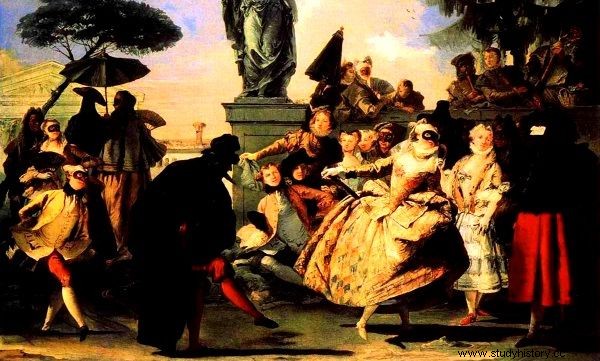
There was a ball once, for a hundred pairs… masked.
Meanwhile, in eighteenth-century Europe, masquerades left their pedestal and became one of the most popular games in cities. The scenery of the redoubts often referred to antiquity or the Orient. Initially, the masquerades were held only during the carnival, twice a week.
Over time, they have become a constant entertainment and way of spending free time. The number of participants in such public games was very large, reaching even 2-3 thousand people. From time to time there were dangerous accidents in the crowd, including being trampled underfoot.
The shoemaker starts dancing between the ladies
Participation in the redoubts was no longer determined by the social position. Therefore, not only the visiting nobility and magnates, or the city patriciate played on them. 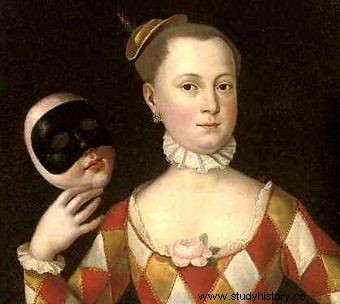
As reported by priest Jędrzej Kitowicz, the author of "Customs for the reign of August III" and the famous diarist:
A shoemaker, tailor and any other craftswomen covered in a mask, had fun with the gentlemen .
It happened that people hungry for fun visited many balls in one evening. Of course, this was connected with the necessity to pay each time a fee, which many people simply could not afford.
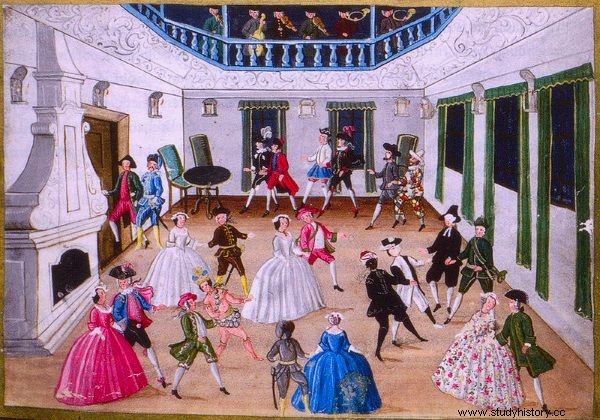
Who is the butler and who is you? Who will guess if they are both dressed up as a monk!
After paying the fee, each participant of the game had the right to use light and music in the room. Other pleasures such as drinks and alcohol were paid separately. During redoubts, lemonade, orangeade, tea, coffee were most often drunk, but also English beer and foreign wines. Kitowicz mentioned that:
Domestic beer in redoubts was not in fashion; meant the peasant who demanded it .
It is worth mentioning that in the circles of wealthy landowners and magnates, alcohol poured in torrents. Only good alcohol, of course, mostly imported.
All the rest of the guests had to be content with inferior liquors. Of course, there were also those who could only afford to pay admission, and they could only dream of lemonades, or even the national beer mentioned by Kitowicz.
Frenzy of disguised bodies
Masks and disguises, which in an earlier era were mainly symbols of fun, now really introduced an atmosphere of mystery. As long as the guy from the lower classes got the right outfit, it was difficult to know his condition or origin.
The most common clothes were monks, coachmen, Cossacks, devils and Jews. The women pretended to be Jewish, Ruthenian peasants, Turks or peasants. Therefore, costumes of plebeian character prevailed, the preparation of which did not require spending a fortune. And which allowed even a wealthy peasant to sneak in to party with aristocrats. This, in turn, opened the way for him to enjoy, which he could never have had in ordinary life…
The rich were careful to make the disguises and practiced to achieve perfection in playing the character . It was up to the acting skills whether the masquerade turned out to be a success or a failure.
The participants of the game tried to guess who was under a given mask. In order to do this, people who were modulating their voices would be talking to them, or they would change their gestures, making it difficult for the interlocutors.
Card games were also eagerly played at games. They were popular among all social groups, irrespective of their financial status and position. As eagerly as men, women also played them.
Initially, the cards were difficult to buy, they had to be imported from abroad. Each card, after the drawing was mirrored, was hand-painted. This resulted in their high price.
At the end of the Polish-Lithuanian Commonwealth, however, cards became a very popular gambling game, and the stakes were sometimes exceptionally high. A Livonian man made a note:
The stakes go to extraordinary sums, and when the wine is blown away, the game becomes incredibly passionate .
Redoubts and romances
Apart from drinking, dancing and playing cards, the participants of the redoubts could also taste forbidden pleasures.
Public masked balls were the perfect occasion to start a flirtation or romance. There were also people willing to use the masquerade for marital infidelity . As a rule, before the fun began, lovers decided what masks they would wear to make it easier to recognize themselves in the crowd.
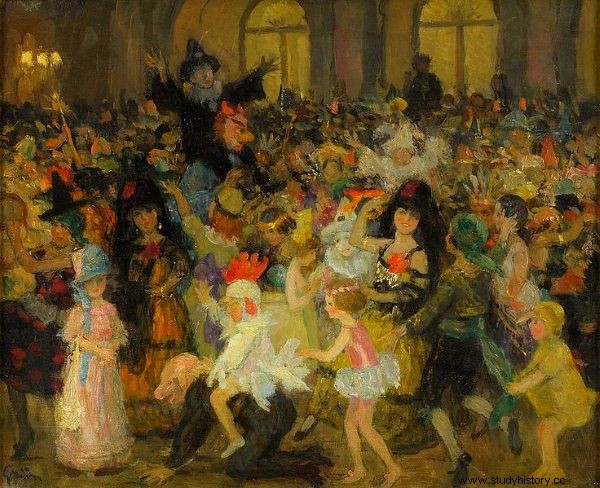
Is there a Countess hidden under the hood? Or is it a washerwoman?
There were two possibilities for those in love who wanted to be alone during the redoubt. A masked bachelor could rent a key to a separate room from the event organizer and lead the lady there. In the general crowd, it was easy for the caregivers to disappear from sight. However, this type of venture was expensive. Another popular way of romancing was by renting carriages. As Kitowicz wrote:
Who then wanted to steal someone else's wife or daughter for an hour secretly left her with redoubt (...). They got into the carriage and either took them to which house, from which there was a bachelor or a lady, or, having ordered a coachman to take a coach along the distant streets, they rode in it and as if nothing had happened, they returned to the redoubts, separately and slightly one after the other entering .
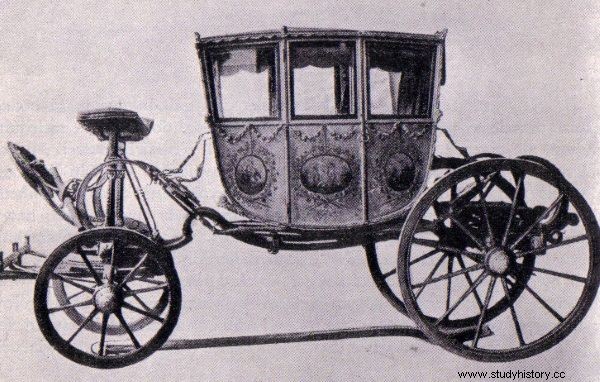
Eighteenth-century carriage. A vehicle or a tryst house on wheels?
There were also people willing to experience a completely crazy adventure: intoxicating night with a stranger, masked partner . Maybe with a prince or magnate, but just as well with an ordinary swineherd.
According to Julian Ursyn Niemcewicz, redoubts were actually a real theater of luxuries and licentiousness . They let you experience a few moments of pleasure and the atmosphere of mystery and conspiracy ignited the minds of people hungry for fun and bodily pleasures.
